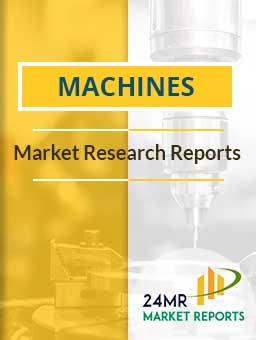
Download FREE Report Sample
Download Free sampleMARKET INSIGHTS
Global pharmaceutical capsule filling machine market was valued at USD 195 million in 2024 and is projected to reach USD 280 million by 2032, exhibiting a CAGR of 5.4% during the forecast period.
Pharmaceutical capsule filling machines are advanced electromechanical systems that automate the encapsulation process. These machines integrate programmable logic controllers, touch-screen interfaces, and precision dosing mechanisms to perform critical functions including capsule positioning, powder filling, and hermetic sealing. The technology enables high-speed production while maintaining stringent quality control standards required in pharmaceutical manufacturing.
Market growth is driven by increasing pharmaceutical production volumes and the industry's shift toward automated solutions. The dominance of fully automatic machines reflects manufacturers' preference for higher throughput and reduced human intervention. Europe leads market adoption due to its concentrated pharmaceutical industry, while Asia-Pacific shows the fastest growth as production capacity expands in China and India. Key players continue to innovate with features like AI-based quality inspection and Industry 4.0 connectivity to meet evolving regulatory and efficiency requirements.
Expanding Global Pharmaceutical Production to Accelerate Demand for Capsule Filling Machines
The pharmaceutical industry is witnessing unprecedented growth, with global drug production expected to increase by approximately 35% between 2024-2030. This expansion is directly driving demand for high-efficiency capsule filling machines as manufacturers seek to optimize production lines. Automated capsule filling solutions enable pharmaceutical companies to achieve outputs exceeding 300,000 capsules per hour while maintaining precision dosing accuracy within ±1% variance. Recent advances in modular machine designs allow for rapid changeovers between different capsule sizes (00 to 4) and formulation types, reducing downtime by up to 40%. With over 75% of oral solid dosage forms being capsules, the need for advanced filling equipment forms the backbone of modern pharmaceutical manufacturing.
Regulatory Push Towards Advanced Manufacturing Technologies Fuels Market Growth
To know more about market statistics, Download a FREE Sample copy
Stringent quality standards from regulatory bodies worldwide are compelling pharmaceutical manufacturers to upgrade their production facilities. Current guidelines emphasize the need for closed-system processing and real-time monitoring capabilities - features increasingly integrated into modern capsule filling machines. Intelligent systems now incorporate in-line weight verification, metal detection, and 100% capsule integrity checks, reducing rejection rates below 0.1%. This technological evolution directly responds to regulatory expectations for data integrity and process transparency. Over 60% of new capsule filling machine installations now include Industry 4.0 compatibility features such as IoT connectivity and predictive maintenance algorithms, creating sustained demand for advanced equipment.
High Capital Investment Requirements Constrain Market Penetration
While automated capsule filling machines offer significant productivity benefits, their adoption faces substantial cost barriers. A fully automated high-capacity machine can require an investment ranging between $500,000-$2 million, with ancillary systems adding another 30-40% to total costs. This pricing structure creates significant challenges for small and mid-sized pharmaceutical manufacturers, particularly in emerging markets where financing options remain limited. Operational expenses, including specialized maintenance contracts (averaging $50,000-$80,000 annually) and replacement parts, further compound the total cost of ownership. Such financial demands currently restrict market growth to large pharmaceutical enterprises and contract manufacturers with substantial capital reserves.
Technical Complexity Limits Adoption Among Traditional Manufacturers
The pharmaceutical industry's transition to advanced capsule filling technologies encounters multiple technical hurdles. Modern machines require operator training programs spanning 200-300 hours to achieve proficiency across the full range of functions. This creates substantial productivity losses during implementation phases. Additionally, handling hygroscopic or low-bulk-density formulations presents persistent challenges, with some specialty drugs requiring customized machine modifications that can extend validation timelines by 6-8 months. These complexities discourage manufacturers who still rely on manual or semi-automatic systems, particularly in regions where labor costs remain competitive against automation investments.
Emerging Markets Present Significant Untapped Potential
Developing pharmaceutical markets in Asia and Africa represent the next frontier for capsule filling machine manufacturers. India's pharmaceutical sector alone is projected to require over 1,200 new capsule filling lines by 2028 to meet domestic and export demand. Localized production initiatives across Southeast Asia are creating demand for compact, cost-optimized machines with outputs of 50,000-100,000 capsules/hour - a segment currently underserved by global manufacturers. Additionally, Africa's nascent pharmaceutical industry offers long-term growth potential, with regional production capacity needing to triple by 2035 to achieve medicine security goals. These markets collectively represent a $1.2 billion opportunity for machine suppliers able to balance advanced features with affordability.
Technological Convergence Creates New Application Possibilities
The integration of artificial intelligence and advanced robotics into capsule filling systems is unlocking novel applications in pharmaceutical manufacturing. Recent developments include self-adjusting machines that automatically compensate for formulation variability, reducing waste by up to 15%. Experimental systems now demonstrate the capability to handle next-generation capsule formats, including biodegradable shells and multi-compartment designs for combination therapies. Furthermore, the emergence of small-batch continuous manufacturing models creates demand for flexible micro-filling systems capable of producing 500-5,000 capsule lots with minimal changeover time. These innovations are expanding the technology's applicability beyond traditional mass production scenarios.
Material Compatibility Issues Pose Persistent Formulation Challenges
Capsule filling machine manufacturers continue to face significant hurdles in handling the pharmaceutical industry's evolving formulation requirements. Highly potent compounds now represent over 25% of pipeline drugs, requiring specialized containment systems that can add $200,000-$400,000 to machine costs. Biological formulations present additional challenges, with many requiring low-shear filling mechanisms and nitrogen blanketing systems to maintain stability. These technical demands strain conventional machine designs, forcing manufacturers to develop application-specific solutions that slow implementation timelines and increase project risks. Furthermore, the trend toward plant-based capsule shells necessitates redesigns of traditional feeding and sealing systems to accommodate different material characteristics.
Regulatory Harmonization Remains Elusive Across Key Markets
Divergent regulatory standards for pharmaceutical manufacturing equipment create substantial barriers to global market access. While the EU's Annex 1 guidelines emphasize contamination control through isolator technology, US FDA expectations focus more on process analytical technology integration. These discrepancies force manufacturers to maintain multiple machine configurations, increasing development costs by 20-30%. Recent attempts to harmonize standards through ICH initiatives have made progress but still leave critical gaps in areas such as data integrity requirements and change control procedures. Such regulatory fragmentation particularly affects smaller equipment suppliers who lack resources to maintain compliance across multiple jurisdictions simultaneously.
Fully Automatic Machines Lead the Market Due to High Production Efficiency and Precision
The market is segmented based on type into:
Fully Automatic
Subtypes: Continuous motion, Intermittent motion
Semi-automatic
Manual
Pharmaceutical Companies Dominate the Market Due to Large-Scale Manufacturing Needs
The market is segmented based on application into:
Pharmaceutical Company
Biological Company
Research Institutions
Contract Manufacturing Organizations
High-Capacity Machines Gain Traction for Commercial Production Requirements
The market is segmented based on capacity into:
Low capacity (Below 15,000 capsules/hour)
Medium capacity (15,000-60,000 capsules/hour)
High capacity (Above 60,000 capsules/hour)
Standard Size Capsules Remain Most Prevalent in Pharmaceutical Applications
The market is segmented based on capsule size into:
Size 0
Size 1
Size 2
Size 3
Others
Technological Innovation Drives Fierce Competition in Capsule Filling Solutions
The global pharmaceutical capsule filling machine market features a moderately consolidated landscape dominated by European manufacturers, with the top four players collectively holding over 30% market share as of 2024. Syntegon Technology leads the market through its comprehensive range of GMP-compliant filling systems, particularly in automatic capsule filling machines that account for over 75% of the market segment. The company's recent acquisition of a Swiss automation specialist has further strengthened its position in high-speed precision filling technologies.
IMA Group and MG2 maintain strong competitive positions through continuous R&D investments, with IMA's modular capsule fillers gaining particular traction among large pharmaceutical manufacturers. Both companies have significantly expanded their Asian manufacturing footprint to capitalize on China's rapidly growing market, which trails only Europe in total capsule filling machine adoption. Meanwhile, Harro Höfliger's specialized machines for novel dosage forms, including enteric-coated and modified-release capsules, have carved out a valuable niche in the biologicals segment.
The competitive intensity is further heightened by ACG Worldwide's vertical integration strategy, combining capsule production equipment with capsule manufacturing expertise. Their 2023 launch of a fully integrated aseptic filling line has set new benchmarks in containment technology for potent compounds. Simultaneously, mid-sized players like Fette Compacting are gaining market share through customized solutions for small-batch pharmaceutical production, reflecting the industry's growing need for flexibility in personalized medicine applications.
Syntegon Technology (Germany)
IMA Group (Italy)
MG2 (Italy)
Harro Höfliger (Germany)
ACG Worldwide (India)
Mettler Toledo (U.S.)
Fette Compacting (Germany)
Lonza (Capsugel) (Switzerland)
Qualicaps (Japan)
Sejong Pharmatech (South Korea)
The pharmaceutical capsule filling machine market is undergoing a significant transformation with the integration of Industry 4.0 technologies, driven by the need for precision, speed, and regulatory compliance. Fully automatic machines now dominate with over 75% market share, leveraging IoT-enabled predictive maintenance and real-time monitoring systems to minimize downtime. These advanced systems reduce human intervention by 40-60% while improving output consistency, making them indispensable for large-scale pharmaceutical manufacturing. The adoption of AI-driven quality control mechanisms has further reduced rejection rates to less than 0.5% in state-of-the-art facilities, creating substantial cost savings for manufacturers.
Flexible Manufacturing Demands
Pharmaceutical companies are increasingly demanding multi-purpose capsule filling machines capable of handling diverse formulations - from hygroscopic powders to microgranules - without cross-contamination risks. This shift is evidenced by 22% growth in sales of modular machines with quick-changeover systems between 2022-2024. Manufacturers are responding with innovations like dual-filling technology machines that can simultaneously process two different formulations, reducing changeover time from hours to minutes. The biologics sector particularly benefits from these advancements, as 38% of new drug applications now involve temperature-sensitive compounds requiring specialized handling.
Environmental considerations are reshaping machine design, with energy-efficient models consuming 30% less power than conventional systems through regenerative braking and servo motor technologies. The EU's revised GMP guidelines now prioritize machines with closed-loop material handling, reducing API waste by 15-20% per batch. Meanwhile, North American manufacturers are adopting stainless-steel-free contact parts to eliminate cleaning-related water waste, with 62% of new installations in 2024 featuring these sustainable designs. These developments align with the industry's broader push toward carbon-neutral production, as capsule filling typically accounts for 8-12% of a pharmaceutical plant's energy footprint.
North America
The North American market for pharmaceutical capsule filling machines is driven by strict regulatory compliance, particularly FDA requirements for precision and sterility. The region's advanced pharmaceutical manufacturing sector continues to invest in high-speed fully automatic machines, which account for over 80% of new installations. Key players like Mettler Toledo and IMA dominate the market, leveraging automation and Industry 4.0 integration. However, high equipment costs and the shift toward outsourcing production to Asia pose challenges for local manufacturers. The U.S. alone accounts for nearly 60% of regional demand, supported by robust R&D investments and biologics growth.
Europe
Europe remains the largest global market, with Germany and Switzerland leading due to their strong pharmaceutical manufacturing bases. Stringent EU GMP standards and sustainability initiatives are accelerating the adoption of energy-efficient capsule fillers from vendors like Syntegon and Fette Compacting. While growth is steady, market saturation in Western Europe has pushed manufacturers to focus on upgrades and retrofits. Eastern Europe, meanwhile, shows potential as a cost-effective production hub. The region’s emphasis on serialization and track-and-track compliance further drives demand for advanced filling systems.
Asia-Pacific
China and India are the fastest-growing markets, fueled by expanding generic drug production and government initiatives like China’s "Made in China 2025." Local manufacturers such as Zhejiang Fuchang Machinery are gaining traction with cost-competitive semi-automatic machines, though multinationals lead the high-end segment. Japan and South Korea prioritize precision machinery for niche therapies. While labor cost advantages persist, rising quality expectations are gradually shifting demand toward automation. The APAC region is projected to surpass Europe in volume by 2027, albeit with lower average selling prices.
South America
Market growth here is constrained by economic instability and reliance on imported machines, but Brazil and Argentina show gradual recovery. Local pharmaceutical companies prefer refurbished or semi-automatic equipment due to budget limitations. Regulatory harmonization efforts, particularly with ANVISA in Brazil, are improving standards, yet lack of local manufacturing expertise keeps dependence on European and Asian suppliers high. Long-term potential exists in biologics, but current demand focuses on small-scale capsule production for generics.
Middle East & Africa
This is an emerging market with sporadic growth, concentrated in GCC countries like Saudi Arabia and the UAE. Governments are investing in local pharma production to reduce import reliance, creating niche opportunities for mid-range automatic fillers. South Africa and Turkey serve as regional hubs, though political and currency risks deter large-scale investments. The lack of technical expertise and servicing infrastructure remains a barrier, prompting suppliers to offer bundled training programs. While adoption is slow, regulatory modernization efforts signal future potential.
This market research report offers a holistic overview of global and regional markets for the forecast period 2025–2032. It presents accurate and actionable insights based on a blend of primary and secondary research.
✅ Market Overview
Global and regional market size (historical & forecast)
Growth trends and value/volume projections
✅ Segmentation Analysis
By product type or category
By application or usage area
By end-user industry
By distribution channel (if applicable)
✅ Regional Insights
North America, Europe, Asia-Pacific, Latin America, Middle East & Africa
Country-level data for key markets
✅ Competitive Landscape
Company profiles and market share analysis
Key strategies: M&A, partnerships, expansions
Product portfolio and pricing strategies
✅ Technology & Innovation
Emerging technologies and R&D trends
Automation, digitalization, sustainability initiatives
Impact of AI, IoT, or other disruptors (where applicable)
✅ Market Dynamics
Key drivers supporting market growth
Restraints and potential risk factors
Supply chain trends and challenges
✅ Opportunities & Recommendations
High-growth segments
Investment hotspots
Strategic suggestions for stakeholders
✅ Stakeholder Insights
Target audience includes manufacturers, suppliers, distributors, investors, regulators, and policymakers
-> Key players include Syntegon, IMA, MG2, Harro Hofliger, Mettler Toledo, ACG Worldwide, and Schaefer Technologies, with the top four manufacturers holding over 30% market share collectively.
-> Key growth drivers include increasing pharmaceutical production, demand for automated solutions, and regulatory requirements for precision in drug manufacturing.
-> Europe is the largest market, followed by China, while Asia-Pacific shows the fastest growth potential.
-> Emerging trends include fully automated machines with AI integration, modular designs for flexible production, and increasing adoption of GMP-compliant systems.

Speak to our Custom Research Team and get the Custom Research in a budget
Custom ResearchFrequently Asked Questions ?
A license granted to one user. Rules or conditions might be applied for e.g. the use of electric files (PDFs) or printings, depending on product.
A license granted to multiple users.
A license granted to a single business site/establishment.
A license granted to all employees within organisation access to the product.
Upto Working 24 to 48 hrs
Upto 72 hrs max - Weekends and Public Holidays
Online Payments with PayPal and CCavenue
Wire Transfer/Bank Transfer
Hard Copy




 Industry Market Size
Industry Market Size SWOT Analysis
SWOT Analysis Industry Major Players
Industry Major Players Revenue Forecasts
Revenue Forecasts Historical and Forecast Growth
Historical and Forecast Growth Profitability Analysis
Profitability Analysis
























